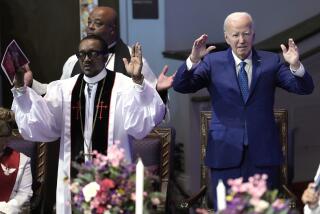Pastor Tells Blacks to Stop Waiting for a Leader : Oppression: Conference speaker says theologians and clergy alike should be willing to act on societal woes.
- Share via
NEW YORK — The Rev. James A. Forbes Jr., the black pastor of one of the nation’s most influential mainline congregations, says it is time for black theologians and clergy to recognize their own obligations to lead and to stop waiting for another Martin Luther King Jr. to shake loose the yoke of oppression.
Everyone, no matter what limitations they believe they might have, should be willing to step forward, Forbes said. Preaching Friday from his own pulpit at Riverside Church in Manhattan, Forbes told a convocation of primarily black theologians and clergy, “You’re still looking for someone who’s going to be a star? Let me tell you, there won’t be no star” without a “supporting cast,” he said.
Forbes, who chose as the title of his sermon “Let My Leaders Go,” charged members of the black religious community and their “white colleagues” with emulating Moses’ reluctance to lead the Israelites, saying, in essence, “Send somebody else” to address the woes of society’s oppressed.
He recalled the great promise of King and the civil rights movement a quarter of a century ago and asked: “Have you wondered why it has taken so long to set our people free? . . . If there are not liberating laborers willing to lead, then the time will not be quite right.”
But Forbes, the first black minister in a pulpit that has been filled by the likes of Harry Emerson Fosdick and William Sloane Coffin Jr., warned that the question of leadership is fraught with issues that the black church has not fully addressed. Those issues include the role of “anybody who’s not us . . . or those who are not like us” and the role of homosexuals.
He asked: “Does God ever call a homosexual to be a leader of the oppressed people? Sometimes, when something looks like a side (issue), it may be a main issue.”
Forbes was the concluding speaker at a convocation on “Black Theology and the Black Church.” Like Forbes, other speakers at the event raised what one participant called “the hard questions” that acknowledge that progress can only come when there is full recognition of where the Afro-American church has fallen short.
The Rev. Peter Paris, who teaches Christian social ethics at Princeton Theological Seminary, summed up his impressions of the conference by noting that, while there is much to commend in black theology and the black churches--a commitment to “courageous, prophetic witness,” for example--there are a number of “unresolved” matters.
Among other things, Paris wondered whether black theologians have sufficiently explored the implications of theology on matters of public and foreign policy; maintained that black theology occupies “marginal space” in most theological schools; claimed black churches have failed to make “substantial commitment” to theological education; said gender segregation remains deeply rooted in the largest black denominations; and voiced concern that middle-class blacks in the suburbs will sever relations with black inner-city churches.
Before the conference ended, several of the approximately 200 participants had volunteered to serve on a committee charged with exploring options for establishing other forums to continue the discussion between black theologians and black church leaders.
The Rev. Renita Weems of Vanderbilt Divinity School argued that “good religion comes as a result of tough questions . . . questions that will make a difference in the midnight hour.”
Those questions, she said, will not dwell on issues such as the validity of speaking in tongues or when baptism should occur, but rather on the tough existential issues such as the presence of evil in a world created by an all-powerful, all-good God.
Weems asked: “Is God among us or not? Can we point in this year, in this decade . . . to one unequivocal instance of God’s presence in our midst?”
“Is he in the intifada? In the East German exodus? In Tian An Men Square?
“Why do I have a baby brother who is an alcoholic and sleeps on the streets of Atlanta?”
At best, Weems said, theology “gives us the tools for the questions.”
“You rarely get an answer,” she said. “You’re lucky if you get a response.”
In part, Weems said, the difficulty can be framed in this way: “You ask for an answer, and God wants to give you a vision.”
She described faith as “inching toward freedom as if it’s almost there” and “living between the last time you heard from God and the next time you hear from God.”
“Faith is not the absence of thinking,” she said, but “that region beyond thinking. But to get there you must first think.”
People in the pews, she said, often “can here more than you think they can. All they ask for is a language they can understand.”
Bishop Ithiel Clemmons of the Church of God in Christ, believed to be the largest black Pentecostal denomination in North America, also spoke of a need to examine the language of black theology.
Black theology, he urged, must reorder its “marvelously unique pedagogical insights to the language of the people” to close a chasm that has widened between pulpit and pew.
The need to “decode the language of popular piety” is all too apparent, he said, when people in black churches turn to televangelists who invoke a view that is “racial” and “conservative” in outlook.
Black church leaders and theologians, he said, must deal more with the role of the Holy Spirit along the lines of religious practice developed in some of the Latin American base communities.
More to Read
Sign up for Essential California
The most important California stories and recommendations in your inbox every morning.
You may occasionally receive promotional content from the Los Angeles Times.













